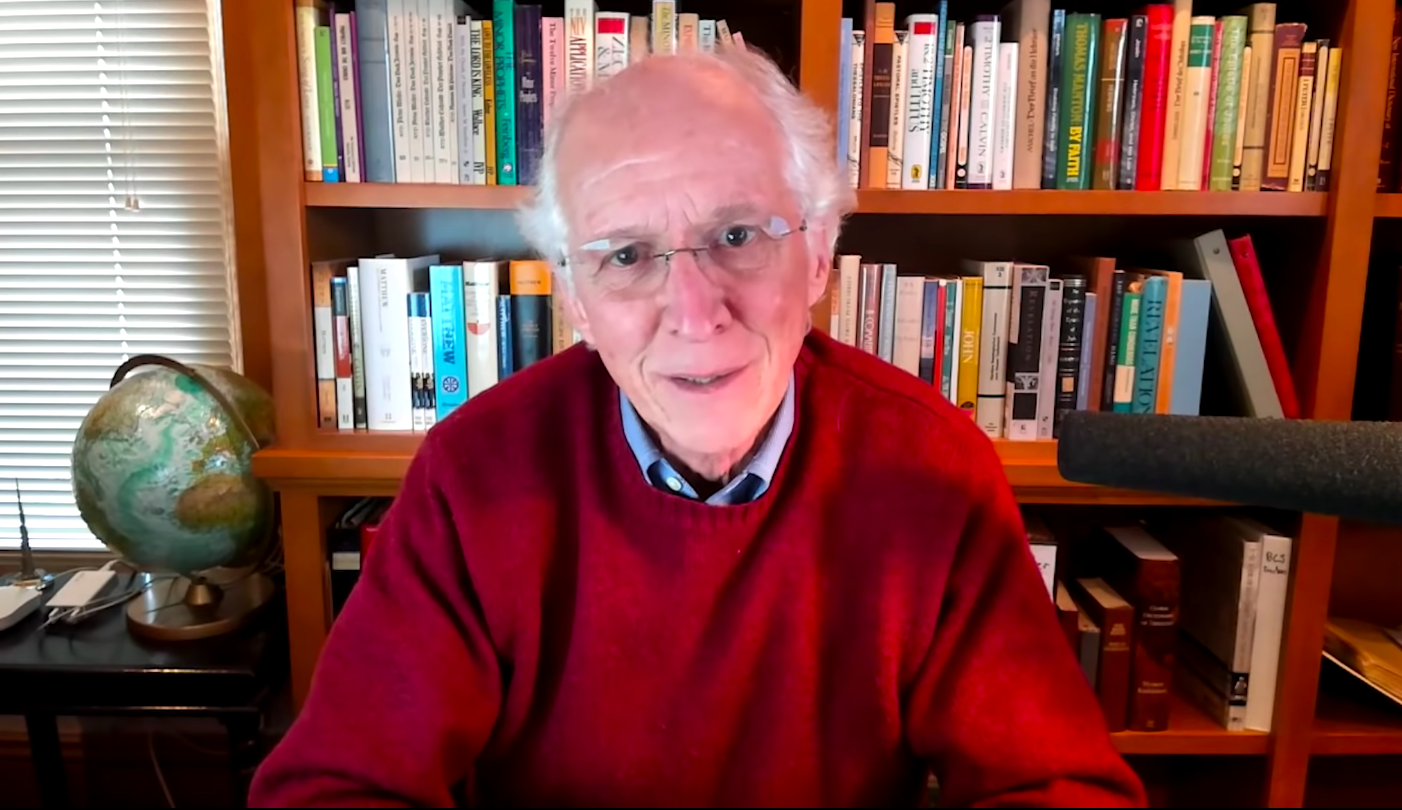“Fight for joy by waiting for Him. Wait for Him”: John Piper
by Tan Huey Ying // June 4, 2021, 5:46 pm

Theologian and pastor John Piper confessed to having been so low in spirit that he could hardly remember his children's names. "The lesson I have learnt is: Wait. Don't do anything precipitous in those moments of darkness as though He's not coming back. He will return." Screenshot of Pastor Piper speaking from his home in Minnesota.
“I don’t want to create the impression that to be a mature Christian means your joy never goes up and down. It does. Faith goes up and down. Hope goes up and down. Joy goes up and down.
“But I think, for the true Christian, the Holy Spirit-given reality of the joy never goes away completely.”
This encouragement by prominent US theologian and founder of DesiringGod.org, John Piper, heartened many a participant at the two-day online Equip Conference organised by Adam Road Presbyterian Church (ARPC) in April this year.
“The devil has two main weapons: Pleasure and pain. Pleasure in the wrong things and pain that takes us away from Jesus.”
Piper had been originally scheduled to speak live in Singapore in March 2020, just as the Covid pandemic was unravelling.
This year, speaking from his home in Minnesota in the United States, Piper, who wrote the bestseller Desiring God, said it has been “tremendously helpful” to figure out how joy and sorrow can be experienced both sequentially and also simultaneously.
On Day 1 of the Equip Conference, he addressed the seeming contradictions of joy and sorrow.
On Day 2 of the Equip Conference, Piper, whose widely-read “Ask Pastor John” column discusses practical, and Scripturally sound, ways for believers to live out their faith, took questions fielded in a Q&A session moderated by ARPC Senior Pastor Christopher Chia and his wife, Mona.

This extract of the Q&A session from the Equip Conference 2021 is published by Salt&Light with permission.
What does it mean to have joy in the midst of suffering? How do we know whether we have joy when we don’t feel it?
Well, if we don’t feel it at all, we probably don’t have it.
I don’t think we can reinterpret joy to the point where it’s a non-experience.
It is an experience, it’s not just an idea.
Joy is a feeling – but let me distinguish it from physical feelings.
“If you are suffering or experiencing a malaise with no joy, don’t settle. Fight for joy.”
If my hands tremble when I’m afraid, or if my knees shake, or if my eyelids flutter, or if I get sweaty palms, or I have butterflies in my stomach. There’s nothing spiritual about that.
There is real spiritual, Holy Spirit-given affection or emotion that’s deeper than physical.
Or if your mind is in some kind of psychological trauma because of loss, or even abuse, that Holy Spirit reality can still be there.
The reason that joy, of that real kind, and sorrow or pain can be side by side, is that they rest on different realities.
If you lose a loved one, and the sorrow breaks over you like a wave, you weep. That’s based on real loss.
But the foundations of joy in being forgiven for your sins, being indwelt by the Holy Spirit, being promised eternal life, being given the promises that everything is going to work together for your good, given the fellowship of the risen Christ … that doesn’t go away.
“I wrote a whole book called When I Don’t Desire God, How to Fight for Joy. Because it is a fight, isn’t it?”
In 1 Thessalonians, Paul said one of the evidences that I know God is at work, calling you to Himself, is because you had joy in affliction.
So if people are suffering or experiencing a malaise with no joy, I would say: Don’t settle for that.
Fight for joy.
I wrote a whole book called When I Don’t Desire God, How to Fight for Joy. Because it is a fight, isn’t it?
I don’t want to create the impression that to be a mature Christian means your joy never goes up and down.
It does: Faith goes up and down. Hope goes up and down. Joy goes up and down.
But I think, for the true Christian, the Holy Spirit-given reality of the joy never goes away completely.
What are some key experiences in your own fight for joy?
During my ministry – I had a 33-year pastorate – there were times it was a struggle to lead in joy.
On Thursdays, before I prepared my sermon on Fridays, I would be so discouraged that I would go to a park to walk by myself.
And I would sit down in the grass and hardly be able to remember my children’s names. That’s pretty low.
I remember them now, I do!
But the point was: A depressed discouraged heart, a heavy soul, you can’t do much, it’s just blank in those seasons.
Just this morning, I read Psalm 40.
“Wait. Don’t do anything precipitous in those moments of darkness as though He’s not coming back; He will return.”
It begins: “I waited patiently for the Lord, He heard my cry. He lifted me up out of the miry pit, He put my feet upon a rock, He put a new song in my mouth, a song of praise to our God. Many will see and fear, and put their trust in the Lord.” (Psalm 40:1-3)
I don’t have any simple prescription for how long you might be low. But you ask about my personal experience and I just say: I have a problem.
Some people would call it a volatile personality. It’s up, it’s down, it’s all over the place – which means I’m capable of pretty high levels of joy and pretty low levels of discouragement.
And the lesson I have learned is: Wait.
Wait. Don’t do anything precipitous in those moments of darkness as though He’s not coming back. He will return.
Genuine saints do walk through seasons of darkness.
We have to fight for joy and one of the key ways to fight is wait for Him. Wait for Him.
In Christian fellowship, we sometimes meet people who trigger us. No matter how much we try, we can’t love them. What should we do?
Practically speaking, all of us are, in our peculiar personalities, able to enjoy some people more than other people.
Jesus seemed to have these concentric circles of “special”, even though He gave His life for the others as well.
I don’t think it’s wrong to want to be with people who make us feel more complete, more full and more appreciated.
You’re responsible for your anger. You can’t excuse it by saying he’s the problem.
Having said that as normal and good, I’m going to encourage people to lean into hard relationships.
You won’t grow as a Christian – that is, you won’t have greater resources of joy and hope and love – if you pull away from every hard situation.
Jesus continually leaned in, all the way into the Cross.
And I doubt that anybody there or here has leaned that far as: I’m going to give my life for you.
So it’s good and fine to relate to people that you know and love and give you all the feedback you want. But we shouldn’t walk away from Christian relationships that are depleting to us.
If another person has spoken to you, or consistently speaks to you, in a way that makes you get angry, you’re responsible for your anger. And you can’t excuse it by saying that’s the problem.
“You won’t have greater resources of joy and hope and love if you pull away from every hard situation.”
But if you’re talking about somebody who is actually luring you consciously into sin, you get to break that off.
Let me come at it one more way.
The Bible says bad company corrupts good morals – 1 Corinthians 15. The point of that is: Don’t hang out with people that corrupt you. If what’s happening is that a person is being corrupted, their morals are being loosened by hanging out with people whose morals are questionable, the Bible says: Create space there.
But I don’t want to let a person off the hook who says: No, I’m just triggered. They’re not corrupting my morals, they’re not loosening and changing my views of right and wrong. They are just triggering anger, self-pity or depression in me.
Then maybe that person has an opportunity for growth.
I struggle when my loved ones are no closer to believing in Jesus after praying for them for so many years. What are some promises that can keep us persevering in evangelism and in sorrow?
That strikes very close to home. I have two sons of my five children that I’ve prayed for all their lives. Forty-five years. Seemingly to no avail.
Because one of my views of prayer is that prayer is never wasted. Ever.
There’s a picture in Revelation of prayers being like incense in a big bowl. And every time you pray, it’s collecting in this bowl. I would like the bowl to be tipped and poured out. It’s my children!
“One of my views of prayer is that prayer is never wasted. Ever.”
But He’s not tipping the bowl. Yet.
And I don’t know how long it may be.
George Mueller, the great British builder of orphanages, and famous for his answers to prayer, prayed for his wife’s healing of rheumatic fever and she died. He preached at her funeral.
Yet he prayed for a full breakfast for his orphans and he had it in 15 minutes. He prayed for some people for 52 years and one of them was converted at his funeral.
Don’t give up. Every day’s prayer has a day’s work to do.
One of the struggles with praying thousands of times for the same request is that you feel like maybe these are vain repetitions that Jesus said, don’t multiply words with vain repetitions. And you feel like I’m saying the same prayer every day of my life. No!
“Don’t give up. Every day’s prayer has a day’s work to do.”
Here’s one way to think about it:
If I pray a prayer this morning, this is today’s prayer, for today’s unique opportunity and providence in their lives, and today’s addition to the totality.
It is not a vain repetition if your heart is really longing for the unbeliever.
You started off with joy being from the Holy Spirit. Many of us forget that it’s the indwelling of the Holy Spirit that keeps us safe from the evil one.
So many people have the notion that the devil is mainly interested in phenomenal evil.
“The main work of the devil is to make us happy in the world, or to make us angry at pain.”
Like if he can get somebody to have some terrible shaking, or some screaming, or some insanity, or some apparition of green things on the ceiling.
When, really, the main work of the devil is to make us happy in the world, or to make us angry at pain. Those are the two things.
The devil has two main weapons: Pleasure and pain. Pleasure in the wrong things and pain that takes us away from Jesus.
Those are the real battles. Every day. Hour by hour.
It’s not like: Oh, the devil shows up once a month, and trips me with some big thing.
No, he’s showing up every hour, alluring your heart to take pleasure in the wrong things, or to get angry at God because of the pain.
This article was extracted with permission from Day 2 of the John Piper Equip Conference organised by ARPC. You can listen to the full Q&A session here.
RELATED STORIES:
We are an independent, non-profit organisation that relies on the generosity of our readers, such as yourself, to continue serving the kingdom. Every dollar donated goes directly back into our editorial coverage.
Would you consider partnering with us in our kingdom work by supporting us financially, either as a one-off donation, or a recurring pledge?
Support Salt&Light


